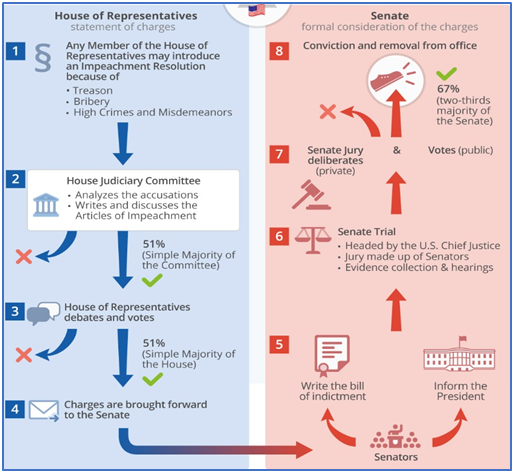House approves impeachment inquiry into US President Biden
15-12-2023
04:11 PM
1 min read

What’s in today’s article?
- Why in news?
- Impeaching a US President
- News Summary: House approves impeachment inquiry into US President Biden
- What is the case against Biden and his son?
- What is an impeachment inquiry, and what does it lead to?

Why in news?
- The US House has approved an impeachment inquiry into United States President Joe Biden and his family.
- This was after Republicans raised allegations against his son Hunter Biden for profiting in business dealings with foreign entities.
Impeaching a US President
- About
- Impeachment is a process that involves a legislative body or tribunal charging a public official with misconduct.
- Under the US Constitution, the President can be removed from office for “treason, bribery, or other high crimes and misdemeanors.” However, these terms have not been defined.
- Criminal charges cannot be brought against a sitting President.
- However, the Constitution does allow for separate criminal charges once a president is removed.
- It is a process that involves both political and legal elements.
- Impeachment is a process that involves a legislative body or tribunal charging a public official with misconduct.
- Process
- The process of impeachment has to be started by the House of Representatives (Lower House) and only needs a simple majority (out of total 435 votes) to pass.
- If the House approves articles of impeachment, or impeaches a president, he or she would then be subject to trial in the US Senate.
- The trial will be held in the Senate (Upper House) as it has the sole power to try all impeachments.
- Here, a two-thirds vote (out of total 100 votes) is necessary for removal.
- The Chief Justice of the US Supreme Court has the duty of presiding over impeachment trials in the Senate.
- History of Impeachment in US
- So far, no US President has been removed from its post as a result of impeachment.
- The presidents impeached by the House were:
- Andrew Johnson in 1868;
- Bill Clinton in 1998;
- Donald John Trump in 2019 and 2021.
- Richard Nixon, the 37th President of the United States, faced the threat of impeachment in the context of the Watergate scandal. Instead of going through the impeachment process, Nixon chose to resign from office.
News Summary: House approves impeachment inquiry into US President Biden
- Republicans in the US House voted to formally authorize an impeachment inquiry into President Joe Biden.
What is the case against Biden and his son?
- The Republicans have alleged that the President’s son Hunter Biden had been profiting in business dealings with foreign entities by managing access to the then-Vice President and his father Biden, who also, allegedly, profited from the same.
- Hunter Biden is already facing criminal charges in two other cases:
- He is charged with firearm counts in Delaware, allegedly for breaking laws against drug users possessing guns in the year 2018, and
- He is charged by United States Special Counsel David Weiss, alleging he failed to pay about $1.4 million in taxes over three years.
What is an impeachment inquiry, and what does it lead to?
- The impeachment inquiry is an official process to impeach federal officials, including the president, based on charges like treason, bribery, and other serious offenses, as stated in the United States Constitution.
- This inquiry is a formal step that could result in consequences for a president, such as removal from office, if found guilty in a Senate trial.


